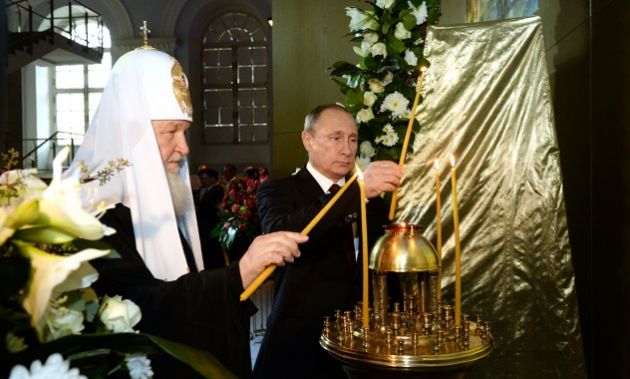Putin praises Orthodox Christians for role in preserving Russian civil peace

President Vladimir Putin has offered another sign he is prepared to coalesce Christian belief with national stability as he congratulated Orthodox Christians and all Russian citizens celebrating Christmas.
"The Russian Orthodox Church, other Christian denominations are playing a huge, truly unique role in reviving the high ethical, moral values, guarding our rich historical and cultural heritage," said Putin in a Christmas message Jan. 7, Interfax news agency reports.
Russian Orthodox Christians celebrate Christmas around the time that Christians further West celebrate the feast of the Epiphany, on Jan. 6 when wise men brought gifts for the baby Jesus after his birth.
The Russian Orthodox Church is the largest of the Eastern Orthodox churches in the world with the overwhelming majority of Christians in Russian belonging to the church.
The Russian Orthodox Church celebrates religious holidays according to the Julian calendar while most non-Orthodox Christians as well as Orthodox believers from some churches use the Gregorian calendar which the Russia has done for secular purposes since 1918.
In his praise of Christians Putin said, "They increasingly cooperate with State and public organizations in the cause of education, enlightenment and charity, in strengthening the institution of family and bringing up the young generation."
According to the Kremlin press office the Russian president said, "The Christmas days are shining a special joy onto our lives, awakening the kindest feelings, turning us towards spiritual sources and traditions.
"This is the time for good thoughts and deeds, sincere care for our loved ones and those who need help and support."
'PRESEVERING CIVIL PEACE'
Orthodox believers and Christians "are doing a great deal for harmonization of the inter-ethnic and inter-religious dialogue, preserving civil peace and accord in our country," said Putin. "Such a big and constructive effort deserves deep gratitude and respect."
He wished "best wishes of health, success and well-being to Orthodox Christians and all Russian citizens celebrating Christmas."
Putin favors the Russian Orthodox Church due to its patriotic and socially conservative message and has expanded massively in the country recent years, Christian Today reports.
Mark Woods writing in the newspaper said that accession in 2009 of Moscow Patriarch Kirill, a Putin loyalist, about 5,000 more churches have been built or recovered from secular use, and the church has recruited 10,000 more clergy, and 122 monasteries have been founded.
In Moscow alone 160 new parishes have been founded.
"While Putin makes a point of including 'other Christian denominations' in his Christmas message, many Russian Christians have deep concerns about the effects of the 'Yarovaya Law' passed last year, a sweeping expansion of anti-terror and public safety measures. Among its effects are a draconian clampdown on evangelism and missionary activity," writes Woods.
The New York Times reported Sept. 13, 2016 that Russia has used tanks and artillery to project its power into neighboring Ukraine and Georgia, but "Putin has also mobilized faith to expand the country's reach and influence."
"A fervent foe of homosexuality and any attempt to put individual rights above those of family, community or nation, the Russian Orthodox Church helps project Russia as the natural ally of all those who pine for a more secure, illiberal world free from the tradition-crushing rush of globalization, multiculturalism and women's and gay rights," wrote Andrew Higgins in the Times.
Over the past two decades, since the collapse of the Soviet Union, there has been an upsurge in affiliation with Orthodox Christianity in Russia, the Pew Research Center said Feb. 14, 2014.
Pew said that between 1991 and 2008, the share of Russian adults identifying as Orthodox Christian rose from 31 percent to 72 percent citing data from from the International Socail Survey Programme (ISSP).